2003 Toyota 4Runner Tires & Services
Get Started
Complete Auto Care for Your 2003 Toyota 4Runner
-
TIRES FOR YOUR 2003 Toyota 4Runner View Tire Info GET TIRE PRICING
-
REPAIR FOR YOUR 2003 Toyota 4Runner View Repair Info SCHEDULE REPAIR
-
MAINTENANCE FOR YOUR 2003 Toyota 4Runner View Maintenance Info SCHEDULE MAINTENANCE
-
OFFERS FOR YOUR 2003 Toyota 4Runner Limited Time Tire Offers VIEW ALL COUPONS
2003 Toyota 4Runner Tires
Recommended Tires | Tire Information
2003 Toyota 4Runner Tires Sizes, Speed Ratings, and Inflation
Not sure about your 2003 Toyota 4Runner tire size? Use the following chart to find information on tire size, speed rating, and inflation.
| Trim Level | Speed Rating | Inflation in PSI F/R | Tire Size |
|---|---|---|---|
| 2003 Toyota 4Runner Sport | S | 32 PSI/32 PSI | P265/65R17 |
| 2003 Toyota 4Runner SR5 | S | 32 PSI/32 PSI | P265/70R16 |
| 2003 Toyota 4Runner Limited | S | 32 PSI/32 PSI | P265/65R17 |
|
2003 Toyota 4Runner Sport Speed Rating: S Inflation F/R: 32 PSI/32 PSI |
|
2003 Toyota 4Runner SR5 Speed Rating: S Inflation F/R: 32 PSI/32 PSI |
|
2003 Toyota 4Runner Limited Speed Rating: S Inflation F/R: 32 PSI/32 PSI |
* Note: these models have different tire sizes depending on vehicle options.
Recommended Tires for Your 2003 Toyota 4Runner
What tires are best for a 2003 Toyota 4Runner? Check out the following tire brands and types.
 ALENZA AS ULTRA
ALENZA AS ULTRA
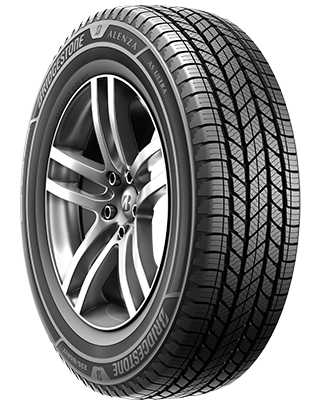
- No warranty
- All-Season
- Light Truck Tires
 Blizzak DM-V2
Blizzak DM-V2
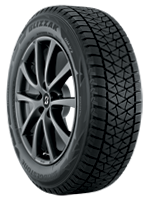
- No warranty
- Winter
- Winter
 Dueler A/T Revo 3
Dueler A/T Revo 3
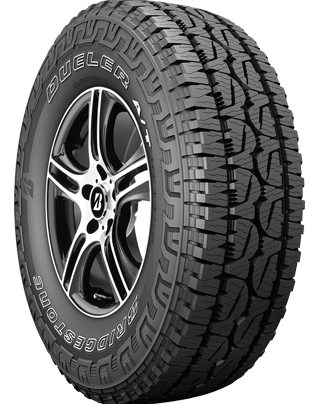
- Platinum Pact Limited Warranty
- All-Season
- Light Truck Tires
 Dueler H/T 684 II
Dueler H/T 684 II
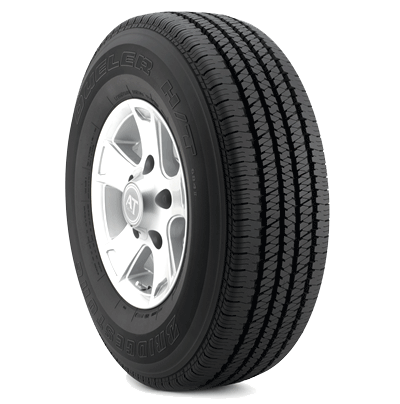
- Platinum Pact Limited Warranty
- All-Season
- Light Truck Tires
 Destination A/T2
Destination A/T2
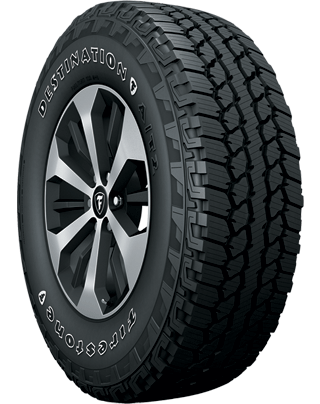
- Gold Pledge Limited Warranty
- All-Season
- Light Truck Tires
 Destination LE3
Destination LE3
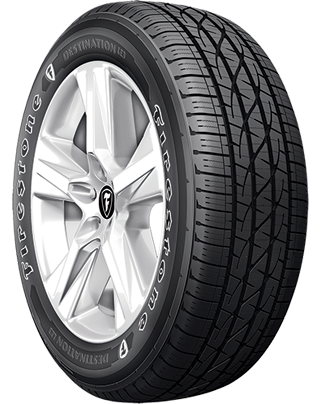
- No warranty
- All-Season
- Light Truck Tires
 Destination X/T
Destination X/T
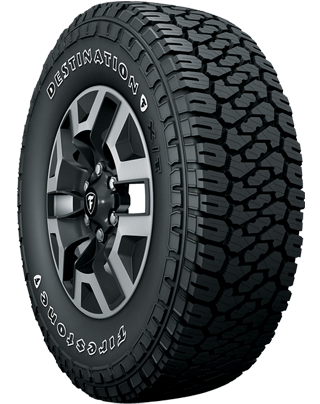
- Gold Pledge Limited Warranty
- All-Season
- Light Truck Tires
 Winterforce 2 UV
Winterforce 2 UV
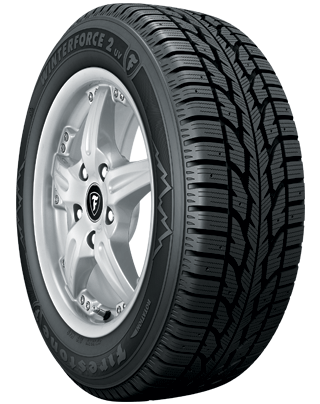
- No warranty
- Winter
- Winter
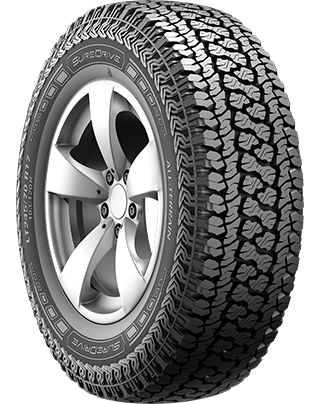
- No warranty
- All-Season
- Light Truck Tires
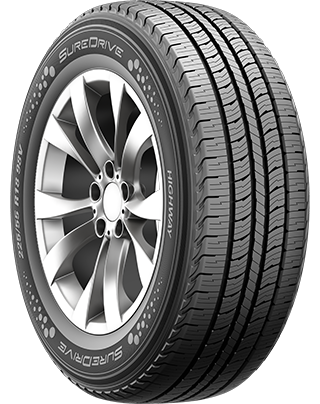
- No warranty
- All-Season
- Light Truck Tires
 OPEN COUNTRY A/T III
OPEN COUNTRY A/T III
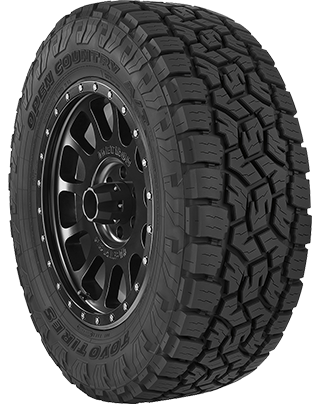
- No warranty
- All-Season
- Light Truck Tires
 OPEN COUNTRY HTII
OPEN COUNTRY HTII
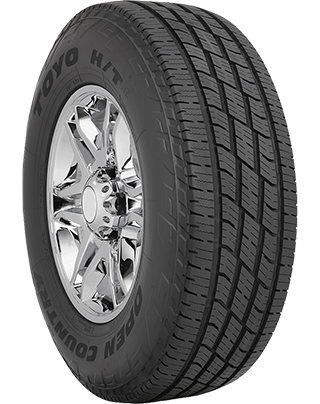
- No warranty
- All-Season
- Light Truck Tires
About 2003 Toyota 4Runner Tires
Other than getting the proper tire size, you also want to consider a handful of other factors when buying new Toyota 4Runner tires like where and how you drive, and what tire brand you trust most. When thinking about your driving conditions, consider where you live (mountains vs. city vs. countryside) and the kind of weather can catch you off-guard. (Watch out Tornado Alley!) Many drivers who live in states that experience all four seasons choose to purchase two sets of tires: one for summer and one for winter. Other drivers prefer to purchase one all-season set to limit trips to the tire shop and make sure their vehicle is prepared in the rain, sleet, snow, or sun!
Next, consider your driving style. If you're a diehard off-roader, you have very different tire needs than a highway commuter who doesn't leave the paved path. Visit your local Firestone Complete Auto Care for help selecting the tire that's right for you, or get started by browsing tires that fit your Toyota 4Runner.
Toyota 4Runner Installation and More
We sell tires, but we also service them and care for all the around-the-wheel components. We're a tire store that also offers professional tire installation, maintenance, and rotation, along with complete auto care. We make it easy to buy new 2003 Toyota 4Runner tires online and book an installation appointment at the same time.
Questions About 2003 Toyota 4Runner Tires
-
Why check Toyota tire inflation? Even a tiny decrease in tire pressure could impact your safety and fuel economy. Maintaining proper tire pressure can help increase fuel economy, improve braking time, and boost tire lifespan.
-
What do the numbers on my Toyota 4Runner tires mean? The numbers on your tire sidewall give you information about tire speed rating, traction, treadwear, tire size, and load carrying capacity. Chat with a tire technician to learn how to read the numbers on your Toyota tires!
-
Is there an easy way to check Toyota tire tread depth? Stay on top of your tire tread depth to help avoid a dangerous drive. You can check tread depth with a penny. Hold the penny so that Abraham Lincoln is facing you, then place your penny into a tread groove upside down. If you can see the top of Abe’s head, your tread is shallow and it might be time for new Toyota 4Runner tires. Grab a penny. Hold the so that Abe Lincon's head is facing you and his hair is pointing toward the ground. Then, place the penny into a tread groove. If you can see the top of Abe’s head, your tread is shallow and it might be time for new Toyota 4Runner tires.
Repair Services for Your 2003 Toyota 4Runner
How do I learn more about auto repairs? Click on a service below to read about the types of Toyota 4Runner repairs we do at Firestone Complete Auto Care.
2003 Toyota 4Runner Repair Information
For most drivers, the words “car repair” don’t exactly spark excitement. But we work to provide you with a different experience at Firestone Complete Auto Care. When you come to us for 2003 Toyota 4Runner repair services, our skilled repair technicians will get your 4Runner back on the road. We’ll start by assessing what repairs may be needed, and we’ll provide you with a detailed explanation of what we recommend. If a repair isn't necessary, we won't recommend it.
How Much Are Toyota 4Runner Repairs?
Several factors can affect the cost to repair your 2003 Toyota 4Runner, including which repairs are needed, the cost of any replacement parts, the amount of labor necessary to get the job done, and your locale. No matter what state you’re in, be sure to look through our offers and online coupons for repairs.
A few different aspects can influence repair costs for your 2003 Toyota 4Runner, like
2003 Toyota 4Runner Auto Repair Questions
-
Do I still need scheduled maintenance even when nothing is wrong with my Toyota? The cheapest 2003 Toyota 4Runner repair is the one that isn’t necessary in the first place! Staying up-to-date with your car’s scheduled maintenance services is a great way to keep future repair costs low.
-
What's wrong if something feels 'off' in my Toyota? You know your vehicle. You also know when something feels 'off' with your vehicle. Pay attention when things don't run like they used to and stop by for a Courtesy Check when you notice an unusual sign, smell, or sensation. We might be able to help you prevent Toyota 4Runner repairs!
-
Do I have to get the repairs you recommend for my Toyota? We won’t recommend a service or repair for your 2003 Toyota 4Runner unless we think it’s necessary to keep you safe. Want to know more about a specific recommended repair? Ask! We’re here to help.
2003 Toyota 4Runner Brake Repair
Your Toyota 4Runner engine may be strong and reliable. But if you can't stop it, then it's scrap metal. If you notice your brakes are squeaking or not working well, don’t wait! Unresponsive brakes make it tough to give the road your best. Plus, waiting can lead to more expensive parts wearing out and requiring replacement. Get your 2003 Toyota 4Runner brakes fixed at Firestone Complete Auto Care. We offer a variety of brake services like brake pad/shoe replacement, brake rotor/drum resurfacing, brake fluid exchange/bleeding, and wheel cylinder and brake caliper installation.
Answers to Your 4Runner Brakes Questions
-
What can cause my 4Runner to shake when I apply the brakes? Feeling shaking or vibrating in your 4Runner as you brake might indicate a few different problems, including worn brake pads or rotors, loose suspension components, damaged brake calipers, or warped rotors. Book an appointment for a free brake inspection as soon as you notice a problem with your brakes.
-
How long should my 4Runner brake pads last? Brake pads generally last between 30,000 and 40,000 miles. Your driving can affect how long your 4Runner brake pads last, though. For example, mainly driving on highways and gradually braking can help increase the lifespan of your brake pads, and carrying hefty loads or riding your brakes can shorten it.
-
Does brake fluid leak when the car is off? Because your 4Runner brake system is a closed hydraulic system, it should not leak brake fluid. However, if components in your brake system have worn out or been damaged, it might cause brake fluid to leak.
2003 Toyota 4Runner Drivetrain Repairs
Drivetrains for front, rear, and all-wheel-drive and 4WD vehicles are quite different, so you don't want to go to just anyone for drivetrain repair. You want to go to Firestone Complete Auto Care. We can fix many 2003 Toyota 4Runner drivetrain components Your Toyota 4Runner may need driveshaft attention if you feel clunks when shifting, vibration as your vehicle accelerates, resistance when turning, or heavy vibrations in your floorboards.
2003 Toyota 4Runner Drivetrain Questions
-
How do I know if my Toyota drivetrain is damaged? Your Toyota 4Runner drivetrain might be damaged if you notice strange noises from the rear of your vehicle, see fluid leaking, or have issues turning.
-
What triggers the malfunction indicator light (MIL) in a 4Runner? If your 4Runner has its malfunction warning light (more commonly called the check engine light) illuminated, it could indicate engine troubles, problems with the transmission, electrical issues, malfunctioning sensors, connector problems, or misfire issues.
-
How worried should I be about a drivetrain malfunction in my 4Runner? If your 4Runner has a drivetrain malfunction, don't wait. Get it checked out by a professional mechanic. Identifying the underlying cause and performing the appropriate repairs right away can help prevent further damage and avoid unsafe driving conditions.
Wheel Alignment for 2003 Toyota 4Runner
An alignment involves making adjustments to your Toyota 4Runner's suspension system, which serves to attach your wheels to your vehicle. In an alignment service, the individual angles of your tires are adjusted so that they come into contact with the road in just the right way — the way Toyota intended them to. When you bring in your 2003 Toyota 4Runner, we’ll perform an alignment check first. After that, we can adjust your wheel alignment angles until they match Toyota’s recommended measurements.
Answers to Toyota 4Runner Alignment Questions
-
How can I avoid knocking my Toyota 4Runner out of alignment? Hitting a pothole or curb can alter your wheel alignment. So can general wear and tear over time.
-
How often does your 4Runner need a wheel alignment? It’s usually suggested you check your alignment about every 6,000 miles or 6 months (whichever occurs first). Still, you should reference your 4Runner owner’s manual for Toyota's recommended interval.
-
Does getting new 4Runner tires mean you need an alignment? While you don’t necessarily need to get an alignment when putting new tires on your 4Runner, it’s still a good idea. Ensuring your wheels are properly aligned can help support optimal handling, tire wear, and fuel efficiency.
Engine Repairs for Your 2003 Toyota 4Runner
If your 2003 4Runner engine needs repairs, our technicians will make sure you understand what’s going on before they start working on your engine. We never do any work without your sign-off. If a repair isn’t urgent right now, we’ll let you know. If it's necessary for your safety, we'll make sure you understand that, too. We want to give you all the details you need to make an informed decision about your engine repairs. By choosing Firestone Complete Auto Care for 4Runner engine repairs and you can drive easy knowing that we use Toyota-approved parts and fluids — serpentine belt, valve guide seal, ignition coil, or a different component.
2003 Toyota 4Runner Engine Q&A
-
Why does the check engine light in my 4Runner turn on when I start my car? It’s usually normal for your check engine light to turn on upon ignition. This is just your 4Runner testing its circuits. The dash light shouldn't stay on. If it does, you might want to bring your vehicle in for service.
-
Why is my Toyota 4Runner making engine noise? Strange engine sounds can be a sign something’s off in your Toyota 4Runner. Knocking or tapping could be a symptom of low oil. A high-pitched whistle could signal an intake leak or misaligned belt. Squealing can be traced back to a loose fan belt, and grinding might be a sign of brake problems rather than engine issues.
-
What could damage a Toyota engine? Certain driving habits can damage your engine and should be avoided. These habits include 'running on fumes,' revving the engine while still in Park, or pushing 'the pedal to the metal' before the engine has warmed up. Help sustain your engine’s performance and efficiency by staying miles away from these bad driving practices.
Get Your Toyota 4Runner Tire Repaired
If your 2003 Toyota 4Runner is in need of a tire inspection or possible flat tire repair, Firestone Complete Auto Care has your back. There’s a chance your tire could be plugged and patched (rather than replaced). Our technicians can inspect your tire and let you know if it is safe to repair. We’ll begin by taking a look at where the damage is, the type and extent of the tire damage, and how all of your tires are wearing.
If your 2003 Toyota 4Runner tire puncture can be repaired, we’ll get to work on the steps to fix it: (1) Take the tire off the wheel for easy inspection, (2) fill the puncture to keep the moisture out, and (3) re-seal the inside lining of your tire so that air won’t escape.
Frequently Asked Toyota 4Runner Tire Repair Questions
-
Can I drive my Toyota on a flat tire? A flat tire that’s not addressed can take a terrible toll on the rest of your car. Until you have it repaired or replaced, drive your 4Runner as little as possible to reduce your risk of damage to the wheels and alignment – or further damage to that already struggling tire!
-
Will a temporary sealant fix my Toyota's flat tire? A temporary sealant may be able to help you get to a repair location safely. But temporary or emergency sealants could possibly damage TPMS sensors, and in some cases may even void the warranty on your Bridgestone or Firestone tires. If your tire needs extensive repair, sealant can add time and labor costs to the process.
-
What can cause 4Runner tires to keep losing air? Tire punctures, damaged wheels, and leaking valve stems are possible reasons for your 4Runner tires continuously losing air.
Maintenance for Your 2003 Toyota 4Runner
Take care of your Toyota 4Runner and it'll take care of you. With the right maintenance at the right time, your 4Runner has a good chance of hitting 200,000 miles or more.
About 2003 Toyota 4Runner Scheduled Maintenance
There's no need to guess when it's time to get 4Runner maintenance, and no need to wait until something goes wrong. It’s as easy as following the recommended maintenance schedule that’s been written specifically for your 2003 Toyota 4Runner! Toyota knows your vehicle inside and out (they made it, after all!), so they’ve designed this schedule with your car’s unique needs in mind. Scheduled maintenance services can vary depending on driving conditions, climate, and other factors; however, there’s a good chance that your vehicle’s recommended maintenance services will include oil changes, tire rotations, brake pad replacement, filter changes, and fluid checks and exchanges. Staying on track with routine service appointments can help your 4Runner perform better, decrease your risk of dangerous malfunctions on the road, and maybe even save you the headache of dealing with common 2003 Toyota 4Runner problems in the future.
Essential Maintenance to Keep Your 2003 Toyota 4Runner Running Newer, Longer
Come to Firestone Complete Auto Care for manufacturer-recommended routine maintenance on your 2003 Toyota 4Runner and our technicians will jump right in with a Courtesy Check. A Courtesy Check helps "set the stage" for your service and catch any small problems before they turn into big repairs. Each Courtesy Check includes a free battery test and an inspection of your 4Runner's windshield wiper blades, head and tail lights, filters, fluid levels, tires, and alignment.
Firestone Complete Auto Care is the place to go for 2003 Toyota 4Runner maintenance. Don’t wait until something goes wrong with your car. Visit your nearest location for proactive maintenance today.
2003 Toyota 4Runner Maintenance Questions
-
When should I have Toyota 4Runner alignment checked? Watch out for pothole damage. If your 2003 4Runner is pulling to one side or the other, your tires or suspension system could be calling out for help.
-
When should I use high mileage oil in my Toyota 4Runner? Got 75,000+ miles on the odometer? Consider high mileage motor oil. High mileage oil is formulated to address the specific problems encountered by high mileage vehicles, or those with more than 75,000 miles. It can help reduce oil consumption, smoke, and emissions from older Toyota 4Runner engines.
-
Can Toyota dashboard warning lights wait? Because there might be a problem under the hood. Those warning lights are there for a reason! As soon as you notice that one’s illuminated, take your Toyota 4Runner to Firestone Complete Auto Care so you can address any small problems long before they worsen.
Battery Size & Replacement for 2003 Toyota 4Runner
Need more info about Toyota 4Runner batteries?
| Battery | Engine | Warranty | Cold Cranking Amps | |
|---|---|---|---|---|
| 27F-3 | V6/4.0L | Replacement 24 months | Performance months | 710 |
| 24F-6 | V6/4.0L | Replacement 36 months | Performance months | 750 |
| 24F-RP | V6/4.0L | Replacement 48 months | Performance months | 750 |
| 24F-3 | V8/4.7L | Replacement 24 months | Performance months | 650 |
| 35-2 | V8/4.7L | Replacement 36 months | Performance months | 640 |
| 24F-RP | V8/4.7L | Replacement 48 months | Performance months | 750 |
Car Batteries for 2003 Toyota 4Runner
Generally, car batteries last from three to five years. Don’t get stranded by your 4Runner’s car battery. Replace it regularly instead! Watch for signs that your current battery is getting too old or too weak. A sluggish engine start, a blinking battery or check engine light, swollen battery case, corrosion-covered posts, or dim headlights can all be signs that your battery is on its last leg.
You can also get a Free Battery Test at your local Firestone Complete Auto Care. Drop in for a free battery check and, if needed, a replacement battery for your 2003 Toyota 4Runner. Car batteries are one of our many specialties! Our expert technicians understand Toyota service recommendations for 4Runner battery cold cranking amps and reserve capacity. Get help figuring out the battery size that fits your car perfectly, and schedule a weekday or weekend battery replacement service for your car.
Top Toyota 4RunnerCar Battery Questions
-
Why doesn’t my Toyota 4Runner battery stay charged? A battery is in its final hour when it will no longer hold a charge. The battery may be too old. Or, you may have been leaving your car doors ajar and the cabin light at night. Stop by for a complimentary battery check at your favorite Firestone Complete Auto Care and get a handle on your car battery’s health.
-
How long can I expect my car battery to last? A car battery normally lasts three to five years, but this number can vary based on battery type, your driving habits, and battery maintenance.
-
What is the white, crusty stuff around my 4Runner’s battery post? The white, flaky stuff that can build up around your 4Runner’s battery terminals is known as corrosion. Acid leaking from your vehicle’s battery post can have a chemical reaction with the air, leading to an accumulation of the white, powdery substance over time. Corrosion can affect the flow of electricity between your battery and the electrical system in your 4Runner, possibly causing issues with electrical performance and starting. If left unaddressed for long enough, it may even cause your battery to prematurely fail.
Oil Changes for 2003 Toyota 4Runner
Toyota recommends changing your 2003 4Runner’s oil at regular intervals. Your 4Runner may need an oil change right away if your check engine/oil change light is on, you hear engine knocking, sense an oil smell in the cabin, or see an excess amount of vehicle exhaust. You may also need an oil change more frequently than Toyota recommends if you haul heavy loads, frequent dusty roads, go off-roading a lot, or go long distances at low speeds.
Whether you need high mileage oil, synthetic oil, or conventional oil, you'll find the right 2003 Toyota 4Runner motor oil at Firestone Complete Auto Care. Consult Toyota's recommendations to select the right 2003 4Runner oil and talk with a teammate to learn more about our oil options: Quaker State® Advanced Durability™ conventional oil, Pennzoil® High Mileage Vehicle® motor oil, Pennzoil Platinum® Full Synthetic motor oil with PurePlus™ Technology, and Shell Rotella® heavy-duty engine oil. During your oil change service, a technician will change your 4Runner's oil, replace and recycle your used oil and filter, inspect the rest of your car’s filters, top-off essential fluids, and perform a courtesy inspection on your entire vehicle. Get professional engine care by making an oil change appointment for your 4Runner today.
Oil Change Q&A for Your 2003 Toyota 4Runner
-
Why is my Toyota 4Runner oil light illuminated? The oil change light in your Toyota 4Runner could be triggered by an overdue oil change. However, if the oil pressure light is on, you may be dealing with low engine oil, a failing oil pump, a clogged oil filter, or a malfunctioning oil pressure sensor.
-
How hard is it to change Toyota 4Runner oil at home? Changing engine oil at home isn’t as simple as it’s made out to be. You’ll have to figure out how to properly dispose of the oil and buy special tools. Having your oil changed professionally can not only reduce the risk of something going wrong during the service, but it’ll also help your car perform smoothly down the road.
-
Why is my Toyota 4Runner exhaust smoke grayish or blue? You could have an oil leak and have a case of burning oil. Looks like it’s time for a professional to take a look. The leak could be the result of worn valve seals, fried piston rings, or old cylinder walls.
2003 Toyota 4Runner Tune-Up & Engine Service
Routine engine tune-ups can bring power back to your 4Runner. The Firestone Complete Auto Care location in your community offers several Toyota 4Runner engine tune-up services. One option is the standard Firestone Tune-Up. The standard Firestone Tune-Up includes new spark plugs (and installation!), a thorough inspection of engine components, and a lifetime parts warranty*. A second service option replaces the air and fuel filter in your 4Runner. Our third service is a thorough cleaning of the fuel system. During this type of tune-up, we use a three-step process to get rid of harmful varnish, dirt, and carbon deposit buildup in your 4Runner’s fuel injectors, throttle body, and throttle plate. This goes a long way in boosting your fuel system’s overall performance. Here’s something to remember when choosing services: the mileage and service history of your 4Runner can determine what kind of service it needs. Talk to a technician about your driving style, mileage, and service history to learn more about your vehicle's specific needs.
*Talk to a Firestone Complete Auto Care teammate for full terms and conditions on warranties.
2003 Toyota 4Runner Engine Tune-Up Q&A
-
When should Toyota 4Runner spark plugs be replaced? Replace spark plugs on time or about every 30,000 miles or so. Spark plugs are small but mighty. The spark of electricity that the plug emits across a small gap creates the ignition for the combustion needed to start your car. Without that spark, your car won't start.
-
What do I do if I see a pool of liquid under my Toyota 4Runner? Puddles could indicate an oil leak, coolant leak, or brake fluid leak– all of which can critically hurt your engine. Have your engine inspected as soon as you spot a pool of liquid in your usual parking spot.
-
How frequently do the fuel injectors in my Toyota 4Runner need to be cleaned? The cleaning schedule for vehicle fuel injectors varies depending on your driving conditions and the type of fuel you use. Some manufacturers suggest cleaning your fuel system as part of routine maintenance, while others will recommend it on an as-needed basis if you’re experiencing poor performance. Reference your Toyota owner’s manual for exact guidelines.
2003 4Runner Toyota Steering & Suspension Services
When you first bought your 2003 Toyota 4Runner, you and your passengers probably enjoyed a ride that was smooth and balanced. Now, however, things are starting to feel a little rough. Perhaps your 4Runner feels bouncy, leans to one side, or makes an unusual noise when going over a speed bump. As soon as you notice that something’s “off” with your 2003 Toyota 4Runner, bring it in for steering and suspension services. We’ll get to the root of the issue and, if your car needs steering and suspension repairs, we’ll go over the services you need and how much they will cost before we do any work.
Questions About 2003 Toyota 4Runner Steering & Suspension
-
Why is my Toyota 4Runner bouncing so much? Excessive bouncing in your Toyota 4Runner might be due to damaged struts or shocks that are unable to absorb road bumps effectively, causing your vehicle to feel more like a pogo stick than a smooth ride.
-
What can cause the front end of my 4Runner to dip forward when I apply the brakes? The forward dip in the front end of your 4Runner when you brake is caused by the weight and momentum transferring to the front wheels. If your suspension system is in bad shape, it can fail to distribute this force, leading your front end to dip further downward.
-
What role do tire pressure and tread depth play in my Toyota's suspension? Keeping your tires properly inflated can help reduce strain on the suspension, and also help you notice when you need new tires. A tire that doesn't have an adequate amount of tread can't grip the road or function as well as the manufacturer intended.
Convenient & Local 2003 Toyota 4Runner A/C Service
Our technicians will work to solve your 2003 Toyota 4Runner A/C problems to the best of their ability. In this A/C performance inspection, we’ll check out the current condition of your 2003 Toyota 4Runner A/C system to see if repair work is required. We’ll test overall system performance, check for any leaks, and measure the system pressure.
When we perform an A/C repair on your 2003 Toyota 4Runner, we’ll also do an A/C evacuation and recharge. To do this, one of our technicians will remove the refrigerant in your A/C system (if there is even any left to remove). Then, they’ll use Toyota’s specifications to evacuate the system. To finish, we’ll add new refrigerant to recharge the A/C system.
2003 Toyota 4Runner A/C System FAQs
-
What’s making my 4Runner A/C put out warm air? An A/C blowing hot air has several possible root causes. There could be an issue with your compressor clutch, a blown fuse, a leak, or a clog in the expansion valve.
-
What can cause an A/C system leak? A/C system leaks are often due to a combination of age and moisture. Rubber seals and gaskets naturally degrade over time, allowing refrigerant to exit and moisture to enter your 4Runner's A/C system.
-
Why won’t my 4Runner’s A/C cool the vehicle when the car is stopped? If your A/C only works when the vehicle is moving, there could be a problem with part of your 4Runner’s A/C or electrical system. Potential issues include low coolant or a faulty cooling fan.
2003 Toyota 4Runner Transmission Service & Repairs
The transmission delivers power from the engine to the wheels so that you can drive on your terms. Because of the transmission’s responsibility to translate the right dose of power into the right amount of speed, even the smallest transmission problems should be addressed right away. 2003 Toyota 4Runner transmission problems can show up as shifting delays, grinding or jumping during acceleration, the car shaking at any speed, or whistling noises or a burning smell coming from beneath the hood. Let Toyota 4Runner transmission problems linger and your could suffer a loss in fuel efficiency or discover that your 4Runner’s not even driveable. Our technicians know how to service your 2003 4Runner up to Toyota-recommended standards. Schedule an appointment at your local Firestone Complete Auto Care at the first sign of transmission problems to help keep your engine running at peak performance.
2003 Toyota 4Runner Transmission Q&A
-
Does my 4Runner's transmission fluid need to be inspected? Regularly checking and exchanging your 2003 4Runner’s transmission fluid is one of the best ways to help the transmission system perform. Some technicians would say that between 30,000 and 60,000 miles is a good timeframe for having your Toyota's transmission fluid checked and replaced, but that timeline can vary depending on how your vehicle is used and your manufacturer’s recommendations. The good news is that transmission fluid leaks are affordable to repair and easy to spot.
-
Can transmission fluid leak from my Toyota 4Runner? Over time, transmission fluid can leak from your Toyota 4Runner, potentially causing transmission problems. A transmission fluid leak may be caused by a damaged transmission pan, faulty transmission cooler lines, worn-out seals, a cracked transmission housing, or an overfilled transmission.
-
Can I still drive my Toyota 4Runner if it has a transmission fluid leak? It’s not advisable to drive your 4Runner if it’s leaking transmission fluid. Your transmission system needs transmission fluid to function properly, and a leak can lead to significant problems, such as overheating or reduced performance. You might even experience transmission failure.
Vehicle Inspection for 2003 Toyota 4Runner
When you bring your vehicle to Firestone Complete Auto Care for any service, we’ll automatically do a multi-point Courtesy Check. First, a technician will pop the hood on your Toyota 4Runner and test the battery to see how much charge it has left – and determine if it may fail in the near future. After we’ve inspected your Toyota 4Runner’s battery, we’ll visually inspect your windshield wiper blades, lights, filters, fluid levels, belts, hoses, tires, and alignment.
Every service performed at your nearest Firestone Complete Auto Care will include a Courtesy Check, but we can also dig deeper and perform a Complete Vehicle Inspection on your 2003 Toyota 4Runner if you prefer. A Complete Vehicle Inspection includes everything in a Courtesy Check, plus an examination (by hand!) of your steering and suspension system, brakes, and exhaust components. With this inspection, we want to help you stay on top of any issues that may wreak havoc on your 2003 Toyota 4Runner if left unaddressed.
Depending on where you live, your local Firestone Complete Auto Care may be able to perform state-mandated inspections or safety tests on your vehicle. Inspections are performed on a state-by-state basis and requirements vary.
2003 Toyota 4Runner Vehicle Inspection Q and A
-
When does my Toyota 4Runner need an inspection? You drive your car, day in and day out, so you know it best. If you notice unusual engine noises or you can’t shake the feeling that something is 'off,' start with a Courtesy Check to stay ahead of potential issues.
-
Help! My 2003 Toyota 4Runner failed the state inspection test. Can you get it to pass? Did your vehicle fail a recent state inspection test? We can help. Come in for a checkup and we’ll diagnose the issue.
-
When’s the best time to have a complete vehicle inspection performed on my Toyota 4Runner? It’s generally a good idea to get a complete vehicle inspection for your Toyota 4Runner before a road trip and/or when something strange occurs and you are unable to find the cause. Signs something is up include dashboard lights illuminating, odd noises coming from the engine, and your steering feeling loose or tight.
2003 Toyota 4Runner Radiator Service
Regular, proactive service on the radiator in your 2003 Toyota 4Runner is essential for long-term engine health. Toyota recommends that you replace coolant (also called antifreeze) at certain intervals, but it’s a good idea to keep your eyes open for any indication that your radiator is failing. Your radiator could be close to causing an engine breakdown if you see coolant leaks under your car, high engine temperatures, or a dashboard light that indicates low coolant.
At Firestone Complete Auto Care, we start by performing a thorough inspection of your Toyota 4Runner cooling system. We’ll do a machine-powered coolant exchange on the system, and then we’ll top off or replace the fluids that were removed (like chemicals, lubricants, and sealants). Lastly, we’ll perform a pressure check to look for leaks. From the radiator cap to the heater core, we’ll take excellent care of your 2003 Toyota 4Runner at Firestone Complete Auto Care.
2003 Toyota 4Runner Radiator Q&A
-
What does an illuminated coolant temperature light mean for my Toyota? Your engine might be about to overheat. If your low coolant light is on, pull over in a safe area and wait for your engine temperature to go down. Once it’s safe to do so, bring your car to your nearest Firestone Complete Auto Care to have the coolant system inspected.
-
Why is my 4Runner overheating? Low coolant, a damaged cooling fan, a faulty water pump, a malfunctioning thermostat, or a clogged radiator could all cause your Toyota 4Runner engine to overheat.
-
Why does the radiator in my 4Runner sound like it’s rumbling or boiling? If your radiator sounds like it's boiling or rumbling, you could have air pockets in the cooling system of your 4Runner. You might also have a damaged radiator cap (super easy to fix!) or a clogged radiator.